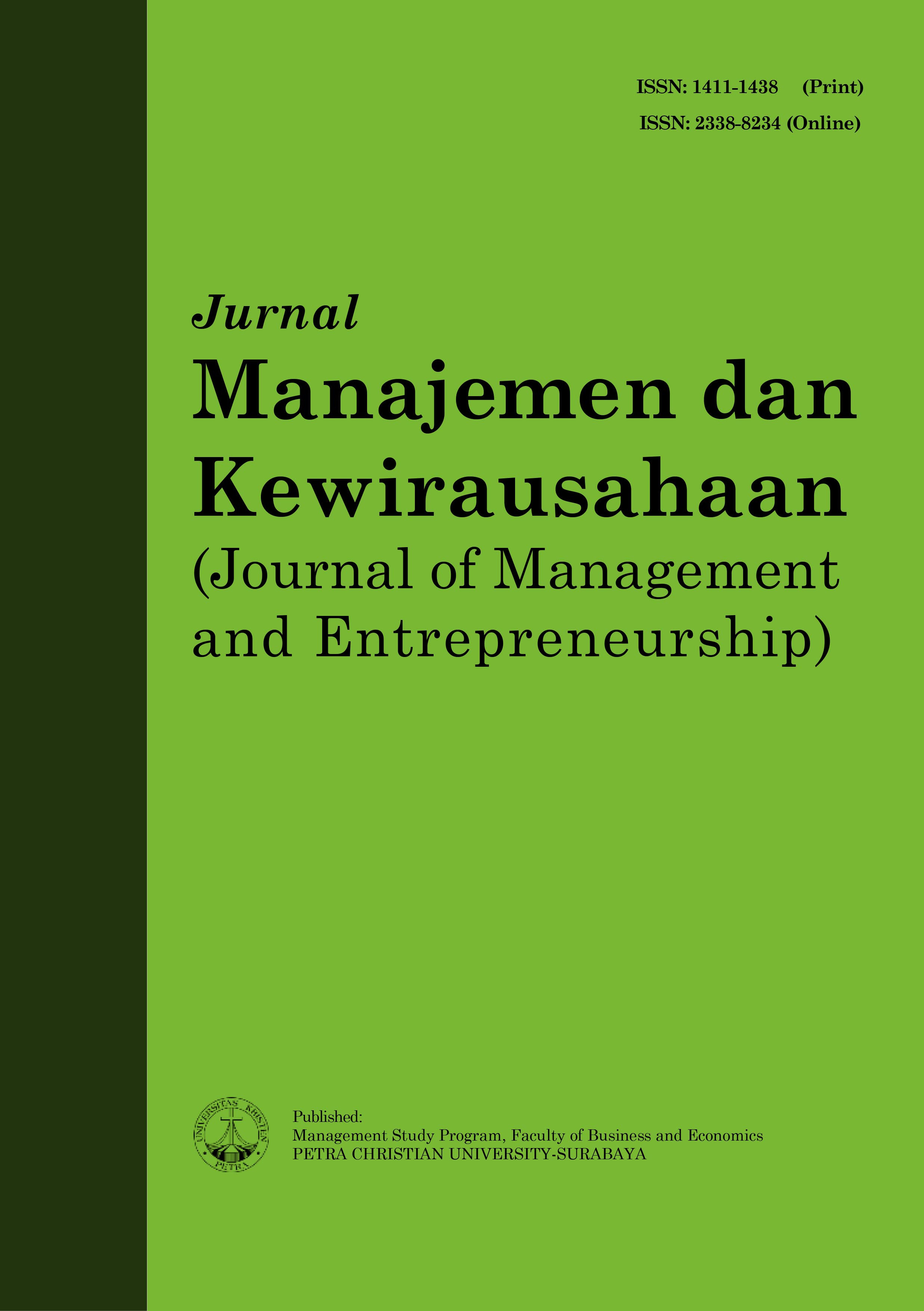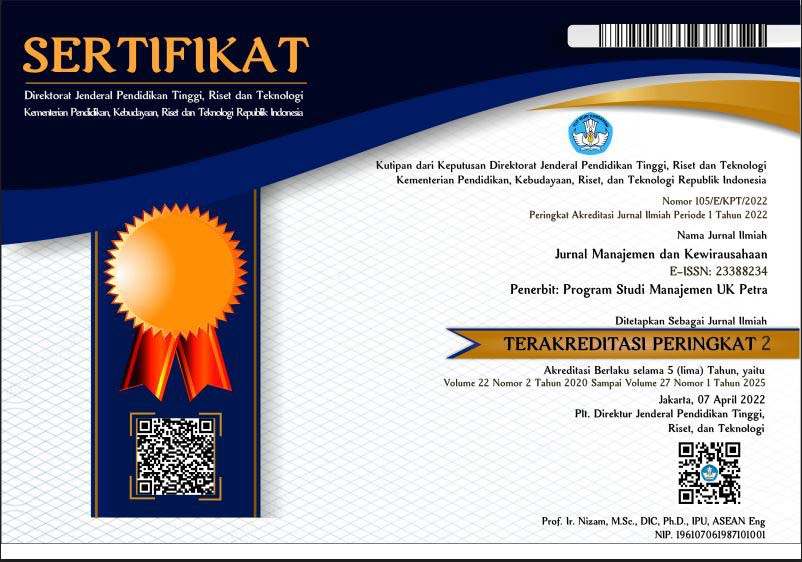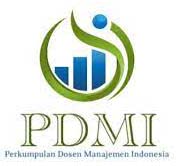THE IMPROVEMENT OF GENERATION Z FINANCIAL WELL-BEING IN PEKANBARU
 :
:
https://doi.org/10.9744/jmk.22.2.142-151
Keywords:
Financial well-being, financial behavior, financial self-efficacy, financial knowledge, financial attitudeAbstract
The current economic condition of generation Z was pretty unexpected. It might trigger problems personally or even their families. This study aimed to reveal the factors influencing the financial well-being and altering personality problems of generation Z. There were more than 800,000 peoples in population and the number of the sample was 239 peoples using a combination of purposive and convenience sampling methods. The data was then analyzed using multiple linear regression. The researchers used primary data by distributing questionnaires based on a Likert Scale. All classic assumptions met the criteria and testing produced financial self-efficacy, financial attitude, financial knowledge, financial behavior, and had a significant positive effect on financial well-being. However, locus of control had no significant effect on financial well-being. Generation Z must increase their independence and confidence to achieve what they want. It would be good to have financial atitude and investment behavior along with financial knowledge. They must also believe that only theirself can provide personal well-being. Generation Z needed character education, more mature, and independent thinking models to deal with economic problemsReferences
Abdullah, Nuraini, Sabri Mohamad Fazli, and Afida Mastura Muhammad Arif. 2019. “The Relationship between Attitude towards Money, Financial Knowledge and Debt Management with Young Worker’s Financial Well-Being.” Pertanika Journal of Social Sciences and Humanities 27(1): 361–78.
Ali, Azwadi, Mohd S. A. Rahman, and Alif Bakar. 2013. “Financial Knowledge and Satisfaction in Malaysia: A Pilot Study.” International Journal of Trade, Economics and Finance 4(5): 319–24. http://www.ijtef.org/index.php?m=content&c=index&a=show&catid=47&id=589.
Ameliawati, Meli, and Rediana Setiyani. 2018. “The Influence of Financial Attitude, Financial Socialization, and Financial Experience to Financial Management Behavior with Financial Knowledge as the Mediation Variable.” International Conference on Economics, Business and Economic Education 2018, KnE Social Sciences: 811–32. https://knepublishing.com/index.php/Kne-Social/article/view/3174.
Arifin, Agus Zainul. 2017. “The Influence of Financial Knowledge, Control and Income on Individual Financial Behavior.” European Research Studies Journal XX(3A): 635–48.
———. 2018. “Influence Factors toward Financial Satisfaction with Financial Behavior as Intervening Variable on Jakarta Area Workforce.” European Research Studies Journal XXI(1): 90–103.
Bujang, Mohamad Adam, Nadiah Sa’at, and Tg Mohd Ikhwan Tg Abu Bakar Sidik. 2017. “Determination of Minimum Sample Size Requirement for Multiple Linear Regression and Analysis of Covariance Based on Experimental and Non-Experimental Studies.” Epidemiology Biostatistics and Public Health 14(3): e12117–1 – e12117–19.
Daoud, Jamal I. 2018. “Multicollinearity and Regression Analysis.” Journal of Physics: Conference Series 949(1): 1–6.
Delafrooz, Narges, and Laily Hj Paim. 2011a. “Determinants of Financial Wellness among Malaysia Workers.” African Journal of Business Management 5(24): 10092–100.
———. 2011b. “Determinants of Saving Behavior and Financial Problem among Employees in Malaysia.” Australian Journal of Basic and Applied Sciences 5(7): 222–28.
Faique, Fathin Ahmad et al. 2017. “Testing the Financial Attitude as a Mediator for the Relationship between Financial Self-Efficacy with Financial Behavior.” Advanced Science Letters 23(8): 8009–12.
Falahati, Leila, and Mohamad Fazli Sabri. 2015. “An Exploratory Study of Personal Financial Wellbeing Determinants: Examining the Moderating Effect of Gender.” Asian Social Science 11(4): 33–42.
Herawati, Nyoman Trisna, I Made Candiasa, I Ketut Yadnyana, and Naswan Suharsono. 2018. “Factors That Influence Financial Behavior Among Accounting Students in Bali.” International Journal of Business Administration 9(3): 30–38. http://sciedupress.com/journal/index.php/ijba/article/view/13552.
Kumar, Suresh, Christalita Watung, Josephine Eunike N, and Lusianna Luinata. 2017. “The Influence of Financial Knowledge Towards Financial Behavior and Its Implication on Financial Decisions: A Survey of President University Students in Cikarang - Bekasi.” Firm Journal of Management Studies 2(1): 169–79. http://e-journal.president.ac.id/presunivojs/index.php/FIRM-JOURNAL/article/view/158/87.
Lind, Douglas A., William G. Marchal, and Samuel A. Wathen. 2018. Economics Statistical Techniques in Business & Economics. Seventeent. New York: McGraw-Hill Education.
Lown, Jean M. 2011. “Development and Validation of a Financial Self-Efficacy Scale.” Journal of Financial Counseling and Planning 22(2): 54–63.
Mien, Nguyen Thi Ngoc, and Tran Phuong Thao. 2015. “Factors Affecting Personal Financial Management Behaviors: Evidence from Vietnam.” In Proceedings of the Second Asia-Pasific Conference on Global Business, Economics, Finance and Social Sciences (AP15Vietnam Conference), Danang-Vietnam, 1–16. https://www.ahajournals.org/doi/10.1161/01.HYP.0000200705.61571.95.
Mokhtar, N., and A. R. Husniyah. 2017. “Determinants of Financial Well-Being among Public Employees in Putrajaya, Malaysia.” Pertanika Journal of Social Sciences and Humanities 25(3): 1241–60.
Mokhtar, Nuradibah, and Husniyah Abd Rahim. 2009. “Determinants of Employee Perception on Financial Well-Being in Putra Jaya.” Malaysian Journal of Consumer and Family Economics.
Nwakuya, M T, and J C Nwabueze. 2018. “Application of Box-Cox Transformation as a Corrective Measure to Heteroscedasticity Using an Economic Data.” American Journal of Mathematics and Statistics 8(1): 8–12.
Pinjisakikool, Teerapong. 2017. “The Effect of Personality Traits on Households’ Financial Knowledge.” Citizenship, Social and Economics Education 16(1): 39–51.
Potrich, Ani Caroline Grigion, Kelmara Mendes Vieira, and Guilherme Kirch. 2015. “Determinants of Financial Knowledge: Analysis of the Influence of Socioeconomic and Demographic Variables.” Revista Contabilidade & Finanças 26(69): 362–77. http://www.scielo.br/scielo.php?script=sci_arttext&pid=S1519-70772015000300362&lng=pt&tlng=pt.
Potrich, Ani Caroline Grigion, Kelmara Mendes Vieira, and Wesley Mendes-Da-Silva. 2016. “Development of a Financial Knowledge Model for University Students.” Management Research Review 39(3): 356–76.
Razali, Nornadiah Mohd, and Bee Wah Yap. 2011. “Power Comparisons of Shapiro-Wilk, Kolmogorov-Smirnov, Lilliefors, and Anderson-Darling Tests.” Journal of Statistical Modeling and Analysis 2(1): 21–33.
Sabri, Mohamad Fadzli, and Leila Falahati. 2003. “Predictors of Financial Well-Being among Malaysian Employees: Examining the Mediate Effect of Financial Stress.” Journal of Emerging Economies and Islamic Research 1(3): 1–16. http://www.jeeir.com/index.php/jeeir/article/view/74.
Sabri, Mohamad Fazli, Laily Paim, Leila Falahati, and Jariah Masud. 2013. “Determinants of Employees’ Financial Well-Being: The Moderation Effect of Work Sectors.” Malaysian Journal of Consumer and Family Economics 16(July 2017): 91–106.
Sabri, Mohamad Fazli, and Nurul Farhana Zakaria. 2015. “The Influence of Financial Knowledge, Money Attitude, Financial Strain and Financial Capability on Young Employees’ Financial Well-Being.” Pertanika Journal of Social Sciences and Humanities 23(4): 827–48.
Schwarzer, R., and M. Jerusalem. 1995. “General Self-Efficacy Scale.” Causal and control beliefs: 35–37.
Sekaran, Uma, and Roger Bougie. 2016. Research Method for Business A Skill-Building Approach Seventh Edition. Seventh Ed. Chichester: John Wiley & Sons.
Serido, Joyce, Soyeon Shim, and Chuanyi Tang. 2013. “A Developmental Model of Financial Capability: A Framework for Promoting a Successful Transition to Adulthood.” International Journal of Behavioral Development 00(0): 1–11.
Susan, Marcellia. 2018. “Financial Behavior and Problems Among College Student in Indonesia: The Role of Financial Knowledge.” International Journal of Engineering & Technology 7(3.25): 133–37. www.sciencepubco.com/index.php/IJET.
Taherdoost, Hamed. 2016. “Validity and Reliability of the Research Instrument: How to Test the Validation of a Questionnaire/Survey in a Research.” International Journal of Academic Research in Management (IJARM) 5(3): 28–36.
Uyanto, Stanislaus S. 2020. “Power Comparisons of Five Most Commonly Used Autocorrelation Tests.” Pakistan Journal of Statistics and Operation Research 16(1): 119–30.
Zulfiqar, Mehwish, and Muhammad Bilal. 2016. “Financial Wellbeing Is the Goal of Financial Knowledge.” Research Journal of Finance and Accounting 7(11): 94–103.
Downloads
Published
How to Cite
Issue
Section
License
Authors who publish on this journal agree to the following terms:
- Authors retain copyright and grant the journal right of first publication with the work simultaneously licensed under a Creative Commons Attribution License that allows others to share the work with an acknowledgement of the work's authorship and initial publication in this journal.
- Authors are able to enter into separate, additional contractual arrangements for the non-exclusive distribution of the journal's published version of the work (e.g., post it to an institutional repository or publish it in a book), with an acknowledgement of its initial publication in this journal.
- Authors are permitted and encouraged to post their work online (e.g., in institutional repositories or on their website) prior to and during the submission process, as it can lead to productive exchanges, as well as earlier and greater citation of published work (See The Effect of Open Access).


















